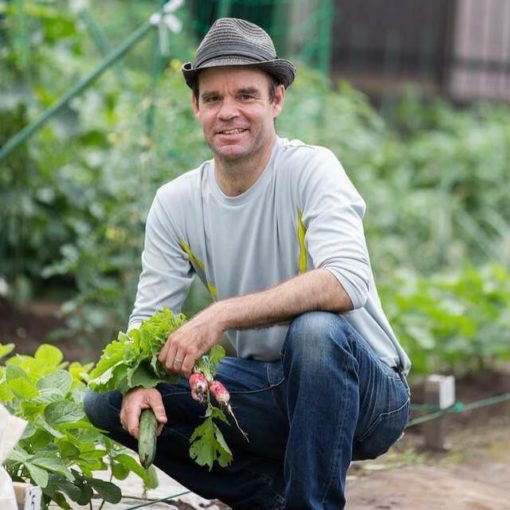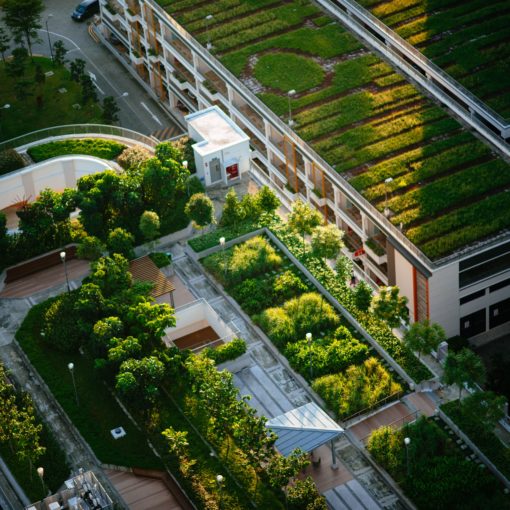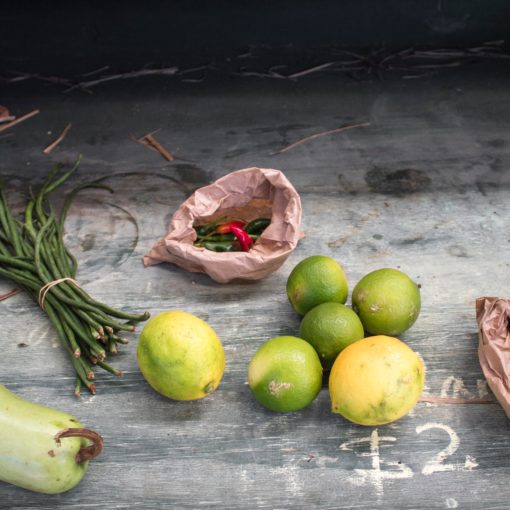Chuck Kayser is from the US and has been in Japan over 20 years, mostly in Kyoto. He started growing vegetables in the mountains of Shiga 12 years ago. What began as a hobby quickly turned into a passion. He established Midori Farm a few years ago to sell vegetables, host volunteers and run tours and events. On top of that, he co-founded Seeds of Sustainability Kyoto in 2017 to host events in Kyoto city. Through Midori Farm and Seeds of Sustainability, Chuck hopes to give people the opportunity to learn more about living sustainably, experience nature and appreciate the importance of small, local, organic agriculture.
Chuck took part in our fifth edition of Conversations with Green Changemakers in Japan and you will find below, the player to listen to the full interview.
This podcast is also available to listen on Apple Podcast, Deezer, Spotify and Youtube.
If you want to know more about the work Chuck is doing check Midori Farm website, Facebook or Instagram as well as Seeds or Sustainability Kyoto Facebook page.
Feel free to reach out to Chuck if you have any questions, if you want to volunteer or visit the farm.
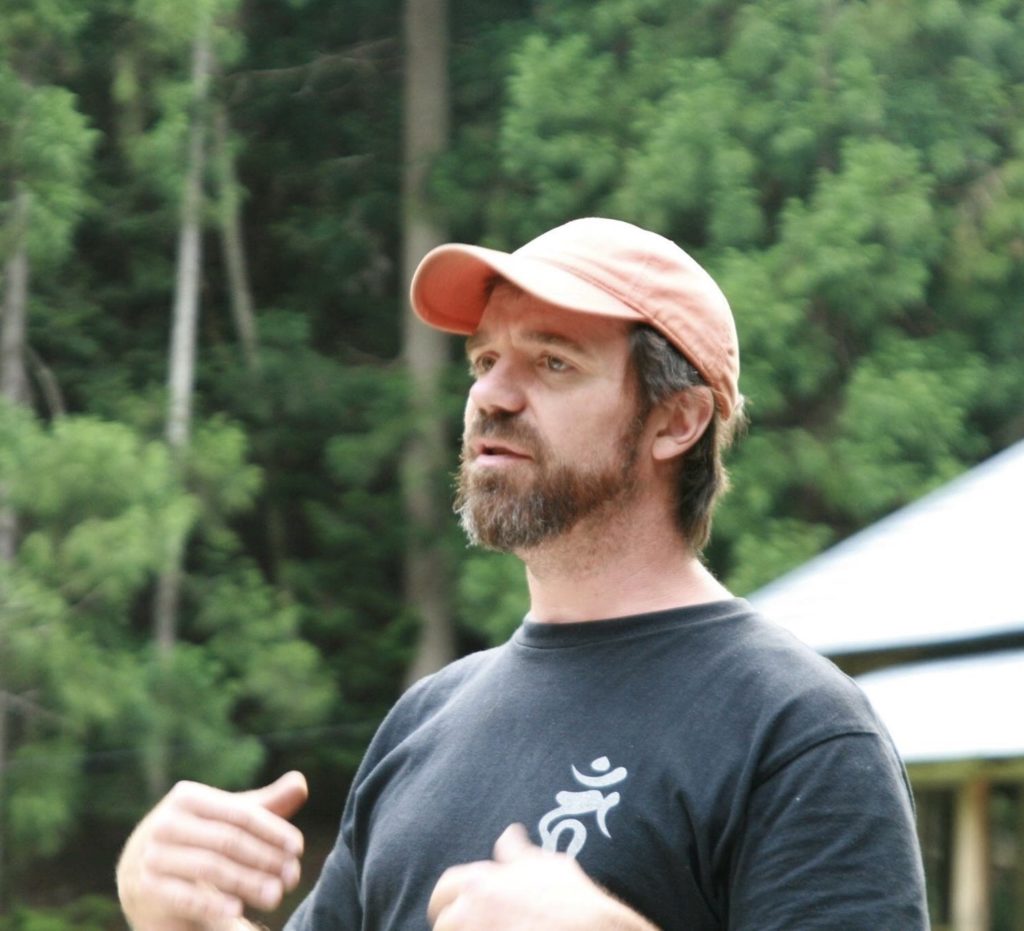
How did you become aware of the climate change issue?
It’s hard to remember exactly when I started figuring out that it was happening, because it has clearly been happening for a long time. When I was a kid in Chicago area, we would get two to three foot of snow in the winter and then sometimes now there’s almost no snow.
But I think the largest impact it’s hard for me is because as I’m farming and spending lots of time outdoors in the mountains of Shiga near Kyoto, I notice these signs even more. There was usually a metre of snow for 3 or 4 months when I started going there about 17 years ago, and I’ve watched it just get less and less every winter.
For example, we usually have people up for sledding in the winter, but last year, we couldn’t do it because there wasn’t enough snow. So I’d have to say that was probably the biggest indicator for me that climate change was real and happening.
And of course working on the farm, I have been able to notice that firs hand. Indeed, farmers rely on frost dates to know when and what to plant so it doesn’t die off. But we can’t figure that stuff out now because it changes too fast and it is not the same pattern as it used to be before when the older farmers were young. So things like that have a strong effect on farmers all over the world.
Your background is in teaching, so can you tell us how you started growing vegetables?
Midori Farm is a name that I started using about three years ago, when I decided to reorganise my farming activities. About five or six years ago, it was called Ok Fields when I started organising my farming activities and doing events, selling my vegetables etc. Before that, it was just me for seven or eight years going out there by myself fiddling in the dirt and hoping I would get something! It actually just started as a hobby and really quickly turned into a passion.
Initially, I just wanted to build a house in the mountains. My friends who lived there helped me to find a small piece of land to buy, the landowner and I got together and we agreed on a price. However, when we went to the town office, as it was a very old property deed, it had to be redone and the land has to be rezoned which was very expensive. So I couldn’t buy it.
The landowner felt really bad about that and offered me to use this patch of land to grow vegetables which is what his wife was doing before she passed away. At the time I had no interested in farming, but my friends recommended me to go through with it as it would be a great opportunity for locals to get to know me, build the trust and ultimately find a place to buy. Indeed, in the Japanese countryside, lands have usually been in the family for generations and they are not comfortable selling it to a stranger.
That is how I started. At the beginning, I failed miserably. The deers ate all my vegetables the first year. The second year, I put up a fence. So I got some. In the third year, I got better and I started to find it interesting. From then, I completely forgot about buying land and I just got hooked by farming.
Can you tell us more about the volunteer programme you started with Midori Farm?
That was the same time when I changed to the name Midori farm and started a website. A woman who had just moved to Kyoto from Canada found me and was interested in buying my vegetables. She also wanted to visit the farm and help out there. She then recommended me to start a volunteer program and introduced me to Workaway.
Workaway is very similar to Wwoof (World Wide Opportunities on Organic Farms), which is one of the original volunteer programmes where people apply to help on organic farms. Workaway came along much later, and has kind of modernised the system and made it more accessible. A lot of hosts are organic farmers but there are actually other businesses such as guest houses and schools etc. who also need volunteers. It really allows volunteers to have unique experiences in their own country or while they travel abroad. Voluntourism is really an amazing way to connect with locals. Also, if you travel on a budget, it allows you to find a place to stay and eat for free in exchange for five hours of work a day, five days a week.
As a host, I have met 40 people or so who come from all over the world and it’s fantastic as it feels like I’m travelling as well! I am always so happy to meet so many different kind of people and introduce them to the Japanese countryside organic farming.
What are some of the joys and challenges about being an organic farmer in Japan?
I’ll start with the joys! It’s amazing to be as close as you can get to a natural system. You have interfere a little bit, but at the same time, you have to cooperate with nature. As an analogy, you can’t fight the ocean. You have to surf, you have to swim and you have to get back on the board when you fall, and organic farming is a little bit like that.
In a lot of ways, it is a lifestyle more than anything else, and in that way, it is completely different than any other occupations I’ve ever had. For me, it has really become a true vocation. I feel a real calling to continue doing this for many years and it is such a joy to be doing something that is so beneficial, so necessary and so natural. I did not study farming nor did I train to be a farmer. I just put some seeds in the ground in Japan and I feel very grateful organic farming found me.
Now on to the challenges. First of all, let me tell everybody out there that monkeys suck! They are the worst things ever because they’ve got thumbs just like we do, they’ve got really sharp minds and they work as a team. I have gone through at least 20 different configurations of fences, trying to keep them out. And when they show up, it’s not just one or two cute little monkeys, it’s 40 or 50 and they just clean the place up in the space of a couple of hours.
So the biggest challenge I would say I’ve had over the years are the large pests, such as monkeys, crows, deers, etc. they can really do a lot of damage in a very short time. Aside from the large predators, insects are also a major catastrophe on the farm.
I mean you have to get everything right in farming such as the timing, the watering, the weeding, the soil preparation, which is a lot to begin with, and be ready to harvest, but then these animals come and they take everything. I’ve been in tears and enraged so many times.
But on the flip side, I’ve learned to deal with so many hardships, so much loss and devastation but still I go on. So I’ve learned this tenacity and this perseverance. You just deal with the situation and you move on because tomorrow is another day and if you give up, you are done. It’s not going to get better unless you do it again.
I’m struggling with a lot of these issues because I do love nature. I do love animals and insects. I respect the environment so much and I really want to be a part of it not in charge of it or dominating it. So one of the major struggles is striking the balance.
Why is it so important to grow and eat organic food?
Simply put, it is for our own health and for the health of the environment. Because clearly pesticides are killing things.
I do use organic pesticides, but they’re designed so that they only kill certain insects that are in a certain stage of their life. So it’s very controlled. But chemical pesticides are not safe for other things so farmers often become ill themselves as they’re handling them on a regular basis and are around them in minimal amount everyday, so it builds up. And it is actually really bad for everything. Not only the people who are spraying them, but the people who are eating the vegetables and the people downriver from the farm because the pesticides are washed off from the farm into the river.
When you buy something, you have to think about the corporations that are making these products. You should think about the fact that you have the power to vote with your money. And if you buy organic, you’re suddenly not only voting for an organic farmer, but you’re also not supporting the conventional farming industry and all the things that conventional farmers invest in such as pesticides etc. So I think about it as a very simple everyday way for people to participate in being more environmental, because you’re suddenly supporting people who are protecting the environment, and you’re not supporting people who are devastating it. So I think it’s very important for those reasons as well.
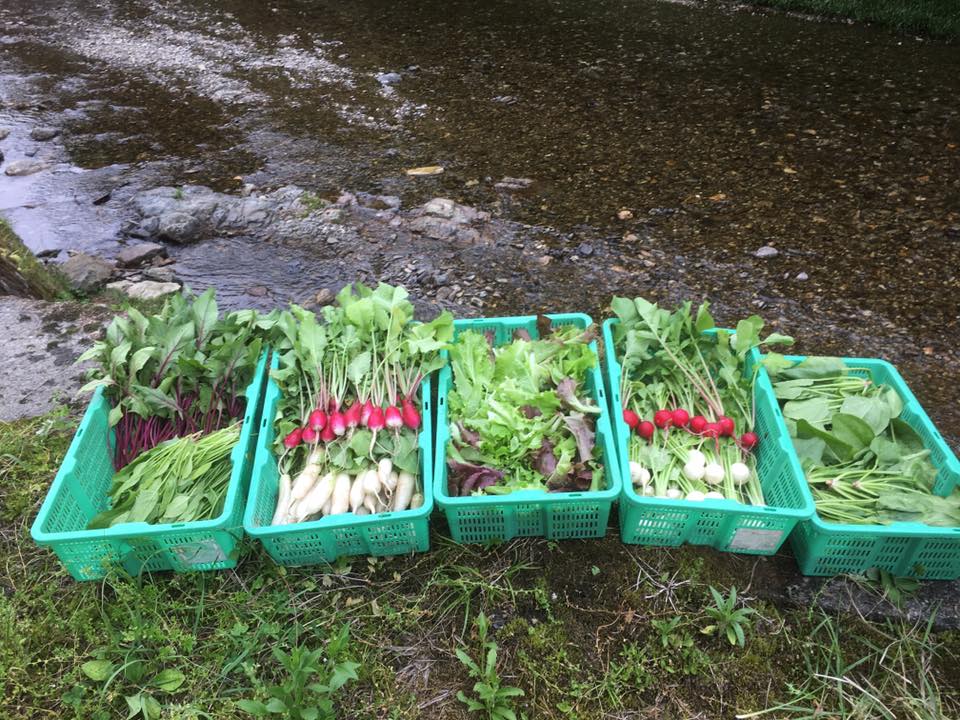
What is the situation in Japan in terms of small organic farmers versus corporate farms?
From just personal experience, the number of farmers and especially small organic farmers is very low in Japan. For the past 50 years, Japan has been on a real decrease in the number of people who want to live the farming lifestyle. So the people who do farm want to maximise their profits and farm in the conventional way.
Japan is a wonderful country and there is great harmony between everyone. everybody’s in great harmony with one another and getting along. But when you are going along with everyone, and suddenly you realise that our way of living is not healthy nor sustainable. It is quite challenging as everybody else is going along with it because that’s what they are supposed to do. That is why organic farming is still on the uptake in Japan. We still need to educate people about why organic farming is so important.
Actually Japan used to be a model for organic agriculture which is what is described in Frankin H King’s book Farmers of Forty Centuries, when he was researching about more sustainable farming models to reapply in US.
Can you tell us a bit more about the food self-sufficiency situation in Japan?
This topic is extremely important and I didn’t know this until I did research for a talk I was giving about four years ago. The self sufficiency rate – based on calories – in Japan right now is below 40% which is quite scary.
However, if Japan were to go back to eating rice, vegetables and a little bit of seafood like they used to till about 100 years ago or so, we would be almost 100%. But because we have been eating so much meat and wheat, those two things are what put us way below self-sufficiency.
You might think that there are lots of chickens, pigs and cows that are raised in Japan. But they are actually the source of the issue. Indeed, if you grow a cow you actually need a lot of cereals to feed it. That food does not come from Japan and is imported. Besides, it is usually GMO corn and soy.
That statics is so important and really show there is a problem in our current system. That is why it is really crucial to be mindful when choosing your food. If you want to support the environment, if you want to support sustainability, you have to eat less meat and eat less wheat (mostly because of the pesticides that are used to grow it) and choose organic local vegetables and rice instead. So I’ve gone off meat, and I eat very little wheat these days, which is actually very healthy. And I love my food still and I don’t feel like I’m missing out on anything.
Can you tell us a bit more about the different types of selling channels for farmers in Japan?
I’m not a trained farmer so I can’t speak about this as a professional. But from my experience, I’ve learned that there are certain farmers who only grow one thing and they sell mainly to wholesalers and supermarkets. There are people who grow for markets like wholesale markets, and they may grow 10 to 100 different things. And there are people who grow for restaurants. All of these can either be organic or conventional.
I grow for direct the customer which is a CSA system (Community Supported Agriculture). In Japan, it’s called Teikei and it’s actually not a new system. Everybody used to know their farmer. Just like they knew their carpenter, their builder, etc. because there were no supermarkets.
So this is the oldest system of selling vegetables. The way it works is that people subscribe and advance then I deliver to them a mix of whatever I have that day. For example, today I harvested carrots, beets, cucumbers, eggplants, zucchini, tomatoes, summer squash and okra. I washed them in the river, put it into a basket, and delivered them directly to my customers without any plastic packaging, no refrigeration or no extra water usage. And I think that’s the most sustainable system there is for small organic farmers who have time to do the delivery themselves.
Do you think organic food is becoming more popular in Japan?
I think so. For example, the Kyoto coop now has an organic section and there are more co-op type of businesses with people getting organic vegetables from the countryside.
I am able to deliver vegetables myself as I live in Kyoto and I have to come back to the city anyway. A lot of people live out in the countryside and can’t do that. So some companies have started doing the round in their truck. In Kyoto area, Kyoto Organic Action is doing a lot to support small organic farmers. So there are people taking it up now and recognising the importance of organic food.
Why is there such a price difference between organic and conventional?
I go back to the bugs, you plant 200 cabbages and you spray with chemicals, you will get 200 of them. If you don’t spray with chemicals and you don’t take care of them you might only get 20, because the bugs will get them all. So you have to use these organic means which are more labour intensive, harder to find, more expensive and less effective.
So if you want to eat an organic carrots you should pay double because the person has worked more than twice as hard and earns that money.
What resources would you recommend?
Do you own experiments and try growing something.
- Don’t give up
- Go get a container and get some seeds
- Don’t forget to water it as this is probably the number one mistake
- Don’t do it for the food, do it for the process
Check out our 5 tips to start growing urban food if you want to get started.
Podcasts:
Farmer to farmer by Chris Blanchard
You bet your garden by Mike McGrath
Other ressources:
J.I Rodale
Farmers of Forty Centuries by Frankin H King
